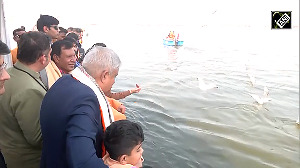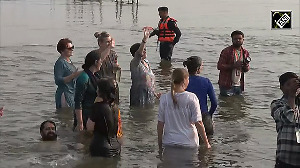Civil Aviation Minister Praful Patel on Friday defended the delay by airline companies in the payment of their fuel bills, saying they were not defaulters. But the petroleum ministry maintained that Jet Airways had defaulted on payment of Rs 259 crore (Rs 2.59 billion) to Indian Oil Corporation.
A day after the petroleum ministry gave details of the dues owed by Naresh Goyal's Jet Airways and its new found ally, Kingfisher, Patel told reporters in Parliament that the airlines had a 60 day period to make payments. "So they cannot be branded as defaulters," he said.
The petroleum ministry countered Patel, saying Jet had failed to make payments even after expiry of the 60-day grace period.
Jet's total outstanding to IOC, the nation's largest oil firm, stood at Rs 859 crore (Rs 8.59 billion), of which it had defaulted on payment of Rs 259 crore (Rs 2.59 billion) worth of bills, which were due on September 25 and October 5 after the expiry of the 60 day period, a senior official said.
Similarly, Kingfisher owed Rs 110 crore (Rs 1.1 billion) to IOC, of which Rs 60 crore (Rs 600 million) remained unpaid after expiry of the credit period.
Jet owes Rs 284.3 crore (Rs 2.84 billion) to Bharat Petroleum while Kingfisher owes Rs 246 crore (Rs 2.46 billion) to BPCL and Rs 525 crore to HPCL.
"It is not correct to say that we are terming them defaulters just like that. We said they were defaulters because they failed to make payments even after the 60 day credit period," the official said.
Petroleum Minister Murli Deora had personally brokered the 60 day credit deal between Jet's Naresh Goyal and IOC Chairman Sarthak Behuria. Deora said on Thursday he felt hurt when Goyal did not keep his word about making timely payments.
The official said both Jet and Kingfisher had to clear their outstanding at the earliest as state-run oil firms themselves were in difficult times. "Our companies have a social obligation to fulfil. They sell subsidised cooking gas to households and even more subsidised kerosene to poor. They have been living on borrowed funds and need funds to keep these subsidised sales going," he said.
IOC, BPCL and HPCL together lose about Rs 280 crore (Rs 2.8 billion) on the sale of petrol, diesel, domestic LPG and kerosene. "Do you now expect them to sell subsidised fuel to the rich travelling by air?" he said.
The three companies had not received oil bonds, which are used to compensate for half of the losses they make on fuel sales, for past three quarters.
The combined borrowings of the three, which stood at Rs 48,400 crore (Rs 484 billion) in March 2007 and Rs 66,900 crore (Rs 669 billion) in March 2008, has increased to Rs 1,10,000 crore (Rs 1,100 billion) as of October.
They lose Rs 2.85 a litre on petrol, Rs 7.26 on diesel, Rs 29.19 on kerosene and Rs 335.03 per LPG cylinder and are projected to lose Rs 1,47,592 crore (Rs 1,475.92 billion) in revenues this fiscal.
The official said ATF was priced at import parity rates (as if the fuel were to be imported) because around 80 per cent of the crude oil used to make the fuel was imported at international rates.
Pricing of ATF was de-regulated on April 1, 2001 and since then it has been governed by fluctuations in the global market. Over the base price, customs duty of 5 per cent, 8 per
cent excise duty, 3 per cent education cess and sales tax at an average of 25 per cent is levied. State taxes and excise duty amounts to about a third of the ATF price.





 © 2025
© 2025